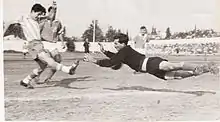Nahum Stelmach
Nahum Stelmach (Hebrew: נחום סטלמך; July 19, 1936 – March 27, 1999) was an Israeli footballer and manager.[4]

| Personal information | |||
|---|---|---|---|
| Full name | Nahum Stelmach | ||
| Date of birth | July 19, 1936 | ||
| Place of birth | Petah Tikva, British Mandate of Palestine (now Israel) | ||
| Date of death | March 27, 1999 (aged 62) | ||
| Position(s) | Manager (former Right forward) | ||
| Senior career* | |||
| Years | Team | Apps | (Gls) |
| 1951–69 | Hapoel Petah Tikva[1] | 349 | (154) |
| 1969–70[1] | Bnei Yehuda[2] | 18 | (4) |
| National team | |||
| 1956–68[3] | Israel[3] | 61 | (22) |
| Teams managed | |||
| 1967–69 | Hapoel Petah Tikva (Player-manager) | ||
| 1987–88 | Hapoel Petah Tikva (General Manager) | ||
| 1999 | Israel | ||
| * Senior club appearances and goals counted for the domestic league only | |||
Biography
Stelmach was born in Petah Tikva, British Mandate of Palestine (now Israel), to a Jewish family. He was chosen third by Yediot Aharonot's greatest Israeli footballers. He made a name for himself as the leader of Hapoel Petah Tikva. At the height of his career in Hapoel Petah Tikva, Stelmach received offers to sign for Arsenal and Fenerbahçe but declined due to his loyalty to the team. He led his team to five national championships, four of them consecutive.
His most recognizable attribute was the quality of his headers, with which he scored most of his international goals. As a result, he was commonly nicknamed "the golden head" in Israel.
He scored what was arguably his most famous goal for the Israeli national football team in an Olympic qualifier against The USSR, with Lev Yashin as goalkeeper at the Ramat Gan Stadium on 1956. Despite the fact that Israel lost the game 2:1 (his goal was a temporary equalizer), and that the game was not televised, that goal is widely considered a defining moment in the history of Israel's national team's early years.
Coach
He was the trainer of Hapoel Haifa in the 1970s, while training the international stars Yochanan Vollach and Itzhak Englander.
Honors
- National league (1st tier) (6):
- Israel State Cup (1):
- 1956–57
References
- נחום סטלמך (in Hebrew)
- נחום סטלמך Archived 2007-11-19 at the Wayback Machine (in Hebrew)
- Stelmach Nahum Archived 2009-04-17 at the Wayback Machine
- "Sporting Heroes: No. 49 Nahum Stelmach".